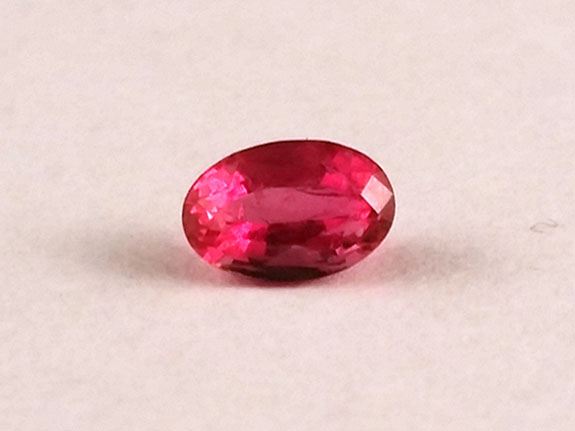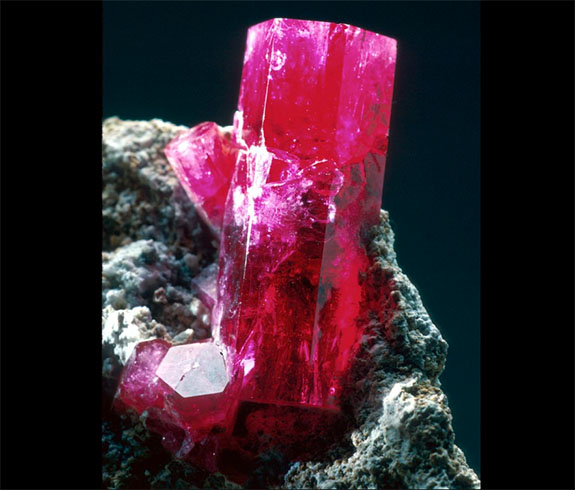Red Beryl: A Gem 'Rarer Than Diamond and More Valuable Than Gold'
"What gemstone is found in Utah that is rarer than diamond and more valuable than gold?"

That was the compelling headline penned in 2002 by the Utah Geological Survey to introduce its readers to red beryl, a little known gemstone found primarily in the state's Wah Wah Mountains.
Discovered in 1904 by Maynard Bixby, this raspberry-red gem had the bookkeeper-turned-miner scratching his head. He had a hunch that the stunning crystals represented a variety of beryl, but the red color didn't correlate with any beryl known to exist at the time.
Today, the best-known varieties of beryl include emerald (green), aquamarine (blue), morganite (pink) and heliodor (yellow).
One year after Bixby's discovery, W.F. Hillebrand, a geochemist from the National College in Washington, D.C., confirmed that Bixby's find was a new type of beryl. In 1912, Dr. A. Eppler named the fiery gem "bixbite" in his honor.

Over time, bixbite assumed several names, including "red emerald" and the more proper "red beryl." The name bixbite fell out of favor because it was often confused with bixbyite, a black manganese iron oxide also discovered by Bixby, in 1897.
Even though more than 100 years have passed since Bixby first encountered the curious red variety of beryl, the mineral has been unearthed in just a few locations — Utah's Thomas Range, Utah's Wah Wah Mountains and New Mexico's Black Range.
Of the three, only the Wah Wah Mountains have produced gem-grade crystals that are large enough to be faceted. The gems are primarily sourced at the Ruby-Violet Claim in Beaver County, Utah. The best specimens of red beryl display a raspberry-pink to slightly purplish-red color.
Writing for the Utah Geological Survey, Carl Ege noted that red beryl was worth 1,000 times more than gold and was so rare that one red beryl crystal is found for every 150,000 diamonds. Because red beryl is rarely found in large sizes, the Gemmological Association of Great Britain estimated that a 2-carat beryl has the same rarity as a 40 carat diamond.
The British gem association reported that the largest known faceted red beryl weighs in at 8 carats.
Gemsociety.org wrote that most fine red beryl crystal specimens are "zealously guarded by mineral collectors and never faceted." The one shown, above, is part of the Smithsonian's National Gem Collection in Washington, DC.
Credits: Faceted red beryl photo by DonGuennie (G-Empire The World Of Gems), CC BY-SA 4.0, via Wikimedia Commons. Red beryl crystal photo by Chip Clark / Smithsonian.

That was the compelling headline penned in 2002 by the Utah Geological Survey to introduce its readers to red beryl, a little known gemstone found primarily in the state's Wah Wah Mountains.
Discovered in 1904 by Maynard Bixby, this raspberry-red gem had the bookkeeper-turned-miner scratching his head. He had a hunch that the stunning crystals represented a variety of beryl, but the red color didn't correlate with any beryl known to exist at the time.
Today, the best-known varieties of beryl include emerald (green), aquamarine (blue), morganite (pink) and heliodor (yellow).
One year after Bixby's discovery, W.F. Hillebrand, a geochemist from the National College in Washington, D.C., confirmed that Bixby's find was a new type of beryl. In 1912, Dr. A. Eppler named the fiery gem "bixbite" in his honor.

Over time, bixbite assumed several names, including "red emerald" and the more proper "red beryl." The name bixbite fell out of favor because it was often confused with bixbyite, a black manganese iron oxide also discovered by Bixby, in 1897.
Even though more than 100 years have passed since Bixby first encountered the curious red variety of beryl, the mineral has been unearthed in just a few locations — Utah's Thomas Range, Utah's Wah Wah Mountains and New Mexico's Black Range.
Of the three, only the Wah Wah Mountains have produced gem-grade crystals that are large enough to be faceted. The gems are primarily sourced at the Ruby-Violet Claim in Beaver County, Utah. The best specimens of red beryl display a raspberry-pink to slightly purplish-red color.
Writing for the Utah Geological Survey, Carl Ege noted that red beryl was worth 1,000 times more than gold and was so rare that one red beryl crystal is found for every 150,000 diamonds. Because red beryl is rarely found in large sizes, the Gemmological Association of Great Britain estimated that a 2-carat beryl has the same rarity as a 40 carat diamond.
The British gem association reported that the largest known faceted red beryl weighs in at 8 carats.
Gemsociety.org wrote that most fine red beryl crystal specimens are "zealously guarded by mineral collectors and never faceted." The one shown, above, is part of the Smithsonian's National Gem Collection in Washington, DC.
Credits: Faceted red beryl photo by DonGuennie (G-Empire The World Of Gems), CC BY-SA 4.0, via Wikimedia Commons. Red beryl crystal photo by Chip Clark / Smithsonian.

